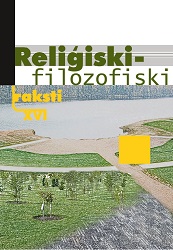Likteņdārzs: tradicionālās latviešu reliģiozitātes transformācijas projekts
The Garden of Destiny: A Project of Transformation of Traditional Latvian Religiosity
Author(s): Elizabete TaivāneSubject(s): Christian Theology and Religion
Published by: Latvijas Universitātes Filozofijas un socioloģijas institūts
Summary/Abstract: The research deals with the memorial complex called Garden of Destiny, dedicated to Latvian victims of the Soviet terror in the 20th century. It is located on the island Krievkalns in Koknese, Latvia. The island is washed by one of the largest Latvian rivers called the Daugava. The complex is just at its beginnings and is due to be completed in 2018. However, the Garden is already very popular among Latvians and lives its wn life. The article analyzes various aspects of traditional Latvian religiosity as the background for the main idea of the memorial complex. The design of the Garden of Destiny belongs to Shunmyo Masuno, a landscape artist from Japan and a Zen monk. Consequently the memorial complex may become a witness to a peculiar mixture of traditional Latvian animistic ideas and those of Zen Buddhism and the Japanese animism. It would be difficult to prognosticate exactly if and in what way the mixture of the mentioned ideas and these worldviews will work, however because of the enormous vitality of traditional Latvian animism and the popularity of Eastern soteriology in the West, the effect of the mentioned mixture must take place and attain some original eclectic form. One of the tasks of the research is to understand how Latvian animism and Zen together with the Japanese animism and cemetery culture correspond to each other. We have found several basic parallels between the two kinds of animism and cemetery cultures, the Latvian and the Japanese ones, insisting that the latter would make the former even stronger and more definite. Zen soteriology, in turn, may modify and ‘spiritualize’ the ‘mundane’ animistic religiosity of the Latvians. The leading idea of the Latvian animism is that of destiny. The notion is deeply rooted in the rural type of life, when human beings depend completely on the nature forces and cycles which seem to be implacable. Man, being just a piece of nature, feels that even the goddess of destiny called Laima is subject to the nature cycles and forces and is incapable to change one’s destiny. She can just lament together with him or her. Hence the idea of just reward has nothing in common with that of destiny. Haralds Biezais, a prominent expert in Latvian religiosity, admits that the idea of destiny is also rooted in the poor political status of Latvians in their motherland during ages beginning with 1197. Being slaves of the Germans and later of Swedes and Russians, Latvians had experienced a very hard situation of slavery, poverty and even starvation for ages. Obviously the tragic events in Latvia in the 20th century are viewed by Latvians in the same light of the implacable destiny. The next idea of the Latvian traditional animism deals with the delicate border between the world of the alive and that of the dead; both realms are situated in the same horizontal plane. That is why the Garden of Destiny is treated as the abode for the souls of the victims whose real graves are often unknown.
Journal: Religiski-filozofiski raksti
- Issue Year: XVI/2013
- Issue No: 1
- Page Range: 185-224
- Page Count: 40
- Language: Latvian

